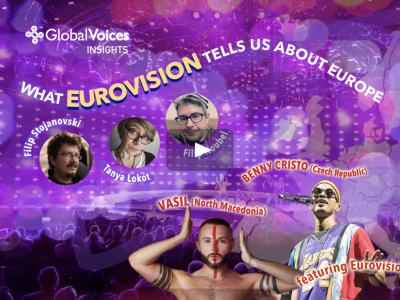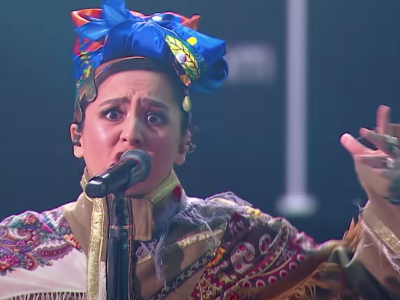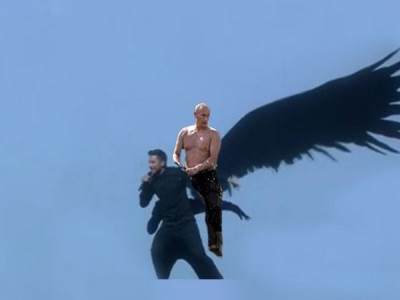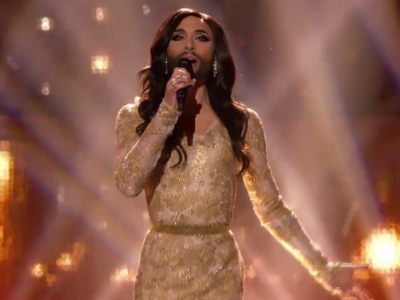
A screenshot from the livestream of the Eurovision first semifinal show.
Since 1956, Eurovision, one of the world’s first truly international song competitions, has been dazzling the world with its over-the-top performances and larger-than-life stars. While it’s garnered a bit of a reputation as being “kitschy” or cheesy due to its incredibly dramatic and often “out there” performances (who can forget the baking grannies or “Hard Rock Hallelujah”), this event is more than just a song competition. In fact, Eurovision has gotten political numerous times over the years.
It has been instrumental in the queer rights movement in Europe and has normalized gender and sexual diversity on the world stage.
This annual contest has also become a way for countries to flaunt their soft power and gain legitimacy — particularly countries newer to the EU that have struggled to make a name for themselves on the European political landscape. Similarly, countries considering EU accession, such as Moldova and countries from the South Caucasus — Armenia, Azerbaijan, and Georgia — are all presenting songs in the 2023 edition, and all have added incentive to cast their country in a good light via the contest.
Last year’s competition, in particular, had some political undertones, as Russia’s war against Ukraine cast a pall on the performances. Because of the invasion and the sanctions that have followed, Russia has been banned from participating in the competition for the last two years. Last year’s competition ended in a bittersweet victory, as the Ukrainian contestants won with their Ukrainian language rendition of “Stefania“ — an homage to motherhood, Ukraine, and nostalgia for better times.
Similarly, Belarus was suspended for three years after it submitted a patriotic and political song in 2021.
While the winners typically host the following year’s competition, Ukraine is unable to this year due to continued attacks from Russian forces. Therefore this year’s event will be held in Liverpool in the UK. Ukraine has been a major Eurovision player since it joined in 2003: it has won three times and was a runner-up twice.
This year’s edition will showcase 37 countries — not all part of Europe, as it includes Australia and Israel. The semi-finals and the final are available on the Eurovision YouTube channel here.
To celebrate this year’s Eurovision competition, Global Voices has compiled this special coverage with pieces discussing everything from language diversity in the competition to the political ramifications of the event.
See our full selection of stories, including archive stories from previous years, below.
Stories about Eurovision 2023: Music is always political
Slovenian rock stars Joker Out: From high school band to post-Eurovision success
Slovenian Eurovision sensation Joker Out discuss their creative process, touring and their upcoming album, which is going to feature songs in multiple languages.
Cultural diplomacy, LGBTQ+ rights, and Ukraine in the 2023 Eurovision Song Contest
On the evening of the Eurovision Grand Final, Ternopil, the home city of Ukraine's 2023 Eurovision contestant, TVORCHI, was brutally shelled by Russian forces.
For Moldovan singer, Eurovision results are a bit of a ‘déjà vu’
Both the winner, Swedish singer Loreen, and Moldova's Pasha Parfeni participated in Eurovision 2012. In 2012, Loreen won the contest, too.
‘You gave me wings': Moldovan Eurovision finalist thanks his fans
Along with the Moldovan singer, musicians from nine other countries qualified from the fist semi-final for the Grand Final: Croatia, Switzerland, Finland, Czechia, Israel, Portugal, Sweden, Serbia and Norway.
Moldova's Eurovision participant makes humorous plug for support on official Instagram
Pasha Parfeni, a Moldovan singer who was chosen during the national round to participate in this year's Eurovision, posted a picture of his car which he wants to sell
The rise and fall of linguistic diversity at Eurovision
Eurovision performers are opting out of their countries' official languages to sing in English in order to gain popularity with judges and fans. But is this a successful strategy?
WATCH/LISTEN: What Eurovision tells us about Europe
Missed the live stream of the May 20 Global Voices Insights webinar on the Eurovision Song Contest? Here's a replay.
Can the Eurovision Song Contest change Russia's views on migrants from Central Asia?
Russia has nominated Tajik-Russian singer Manizha as its representative for the 2021 Eurovision Song Contest. But many Russians reject her as the chosen face of their country at the international event.
Belarus banned from 2021 Eurovision contest for controversial song lyrics
The European Broadcasting Union found Belarus to be "in breach of the rules of the competition that ensure the Contest is not instrumentalized or brought into disrepute."
Russians Aren't Happy About Losing Eurovision, But They Weren't Happy Before, Either
Russia's narrow defeat this weekend in the 2016 Eurovision music contest wasn't the only tension in a competition full of lights, pyrotechnics, and nationalism.
Ukraine's Eurovision 2016 Entry Is About Stalin’s Repressions. Russia Isn't Thrilled.
Ukraine’s entry for the Eurovision 2016 music contest is a song about the deportation of the Crimean Tatars by the Stalin regime. So why are Russian officials upset?
Finland's Eurovision Finalists Sing About Discrimination Against the Intellectually Disabled — From Experience
All of the members of Finnish punk rock band Pertti Kurikan Nimipäivät have intellectual disabilities. They recently won the competition to represent Finland in the Eurovision semifinals.
Russians Hate Eurovision's Bearded-Lady Champion
On the Internet, Russians have reacted to Wurst’s victory with a mix of humor and homophobia.














